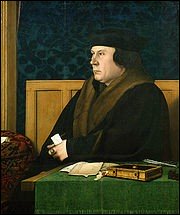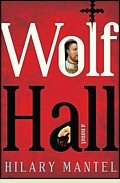|
Wolf Hallby Hilary MantelReviewed by Margaret Donsbach Cromwell, a commoner's son, made himself indispensable as an aide to the wily and powerful Cardinal Wolsey during the first part of Henry's reign. Weathering Wolsey's downfall, he then succeeded where Wolsey had failed in constructing a route for Henry to set aside Katherine of Aragon and crown Anne Boleyn as his queen. The central conflict in Wolf Hall is between Cromwell and Thomas More. More, beheaded in 1535 for refusing to swear an oath to defend the right of Anne's children to succeed to the throne over Katherine's daughter, was canonized as a Catholic martyr four hundred years later. Since then, the struggle between More and Cromwell has been portrayed as a clash between a courageous saint and his evil persecutor. More's admirers have glossed over his crusade against Protestantism, which led to the torture and burning of men who distributed Tyndale's English New Testament. Wolf Hall brings this back into the open, a reminder that religious steadfastness is not necessarily a virtue or flexibility the Mark of Evil. The best novels about the complexities of power politics do not make light reading. In Wolf Hall, a profusion of pronouns with unclear antecedents slows things down further (a doubtful "he" usually refers to Cromwell), but readers who relish a good political novel will forgive this one flaw in an otherwise masterful work. Among the novel's many pleasures is a brilliant three-page overview of English royal history (in Cardinal Wolsey's voice) which, besides being delightfully humorous, makes it clear why the begetting of a male heir seemed so crucial not just to Henry personally but to England's hopes for peace and prosperity. (2009, 532 pages) Wolf Hall is #1 on my "Best Historical Novels I Read in 2009" list. See "The Old "Loller" Woman: Violence and Death in Hilary Mantel's Wolf Hall" by Erwin Biener More about Wolf Hall from Powell's Books or Amazon.com
Stage of Fools by Thomas Brady (1953), an admiring novel about Thomas More. More info St. Thomas's Eve by Jean Plaidy (1954, also titled The King's Confidante), about Thomas More and his daughter Margaret. More info Dissolution by C.J. Sansom (2003), #1 in the Matthew Shardlake mystery series featuring a sleuth who works for Thomas Cromwell and set during the dissolution of the monasteries, several years after the close of Wolf Hall. Review or More info at Powell's Books. Readers may also be interested in Prince of Darkness, an excellent article about Cromwell by C.J. Sansom.

Thomas Cromwell: The Rise and Fall of Henry VIII's Most Notorious Minister by Robert Hutchinson (2009), presents Cromwell in a typically negative light. More info Reform and Renewal: Thomas Cromwell and the Common Weal by Geoffrey R. Elton (1973), a respectful look at Cromwell as an intellectual and religious reformer. More info The Life of Thomas More by Peter Ackroyd (1999). More info Thomas More by John Guy (2000), a reassessment of More's life that attempts to find the more complex truth behind the idealized portraits of him. More info Two Early Tudor Lives: The Life and Death of Cardinal Wolsey by George Cavendish; The Life of Sir Thomas More by William Roper (1962 Yale University Press edition), a contemporary account of Wolsey's life by a Tudor courtier and one of More's life by his son-in-law. More info
A Man for All Seasons
A short biography of Thomas Cromwell at EnglishHistory.net A video interview with Hilary Mantel about Wolf Hall at Guardian.co.uk Back to Novels of the Renaissance
|
